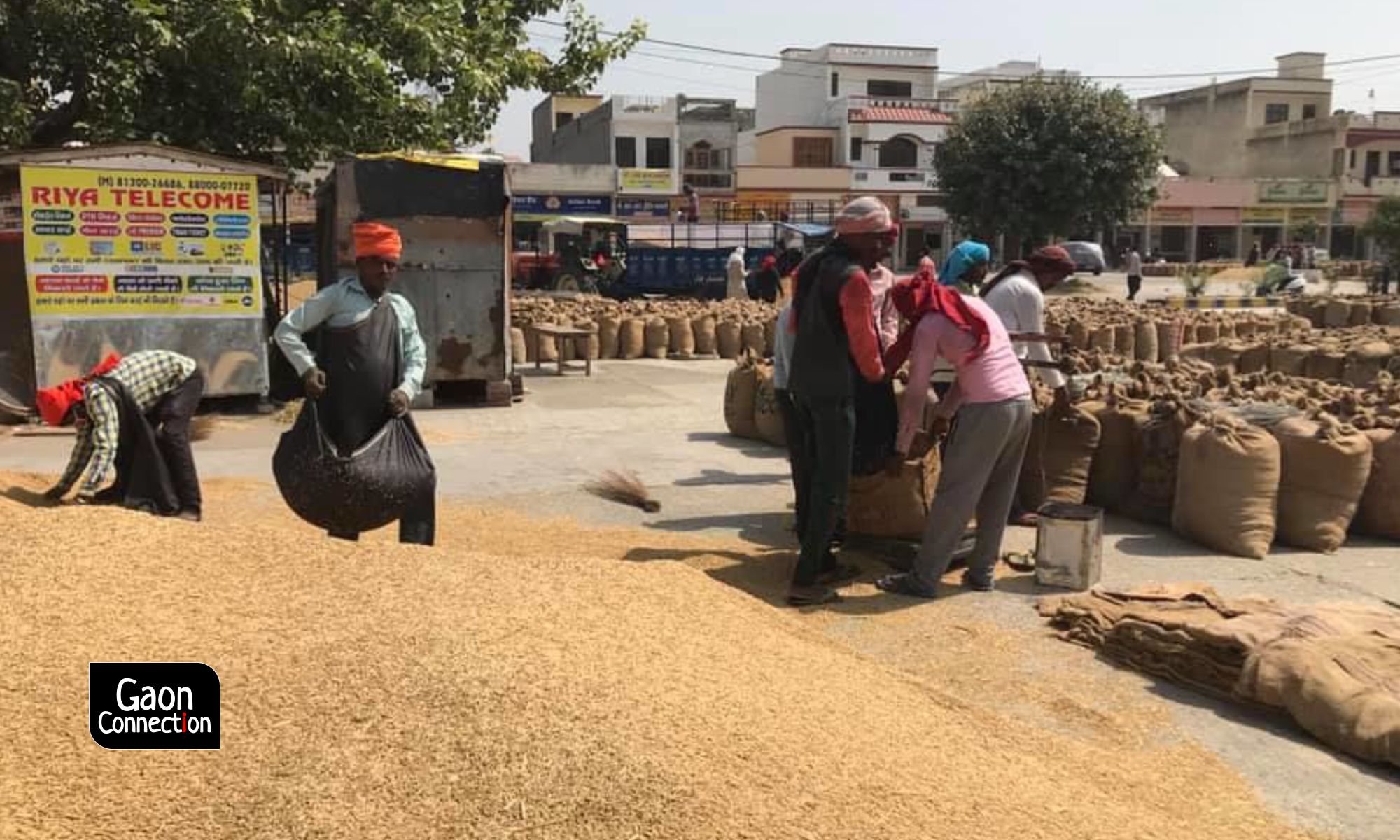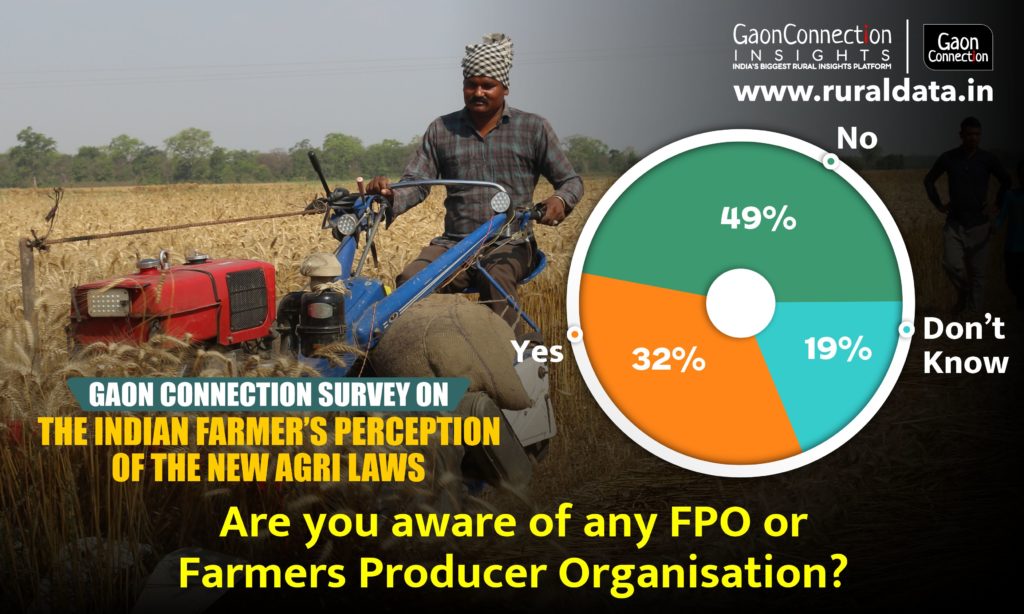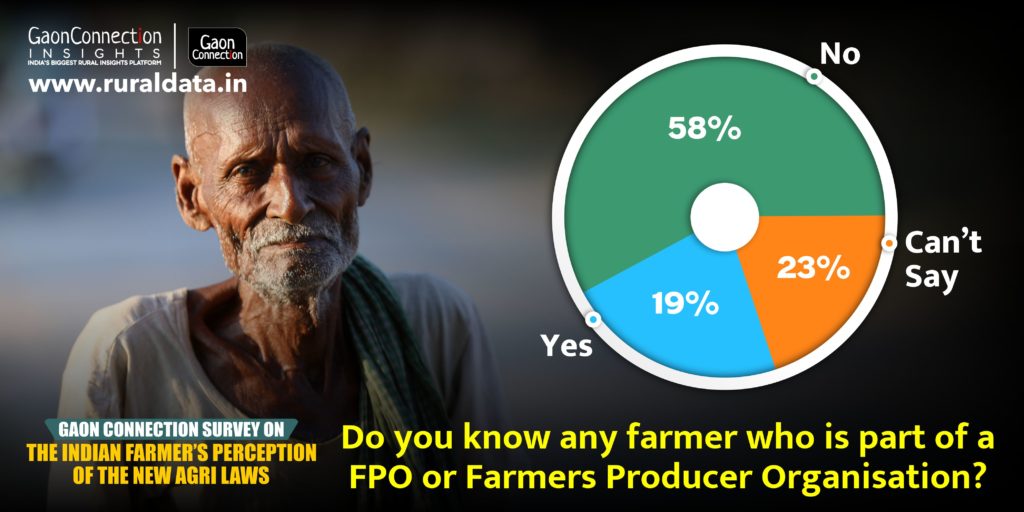Half the farmers unaware of FPOs, majority of them are small and marginal farmers: Gaon Connection Survey
The Central government has ordered 10,000 new Farmer Producer Organisations to be opened by the year 2024. But the Gaon Connection rapid survey found nearly half of the respondent farmers were not even aware of FPOs.


Rajinder Kumar Kaushal, a resident of Gadiyar village in Kasauli tehsil of Solan district in Himachal Pradesh runs Banasar Kisan Samriddhi, a Farmer Producer Organisation (FPO). It has been functioning since 2016 with about 350 members, mostly tomato and ginger farmers of that area. Eighty per cent of them are marginal farmers owning up to one hectare land only.
“The FPO is a better source for small and marginal farmers to get good prices for their crops. So, if the government promotes FPO through agricultural laws, it will definitely benefit the farmers,” Kaushal told Gaon Connection, referring to the three new agri laws recently enacted by the central government.
In a rapid survey, conducted by Gaon Connection between October 3 and 9, to get farmers’ perspectives on the three new agri-laws, it emerged that of the 5,022 respondent farmers across 53 districts in 16 states, nearly half (49.4 per cent) were ignorant of the FPOs, and most of these were small and marginal farmers (51 per cent). Small and marginal farmers are those who own less than two hectares of land.
Only 32 per cent farmers were aware of the FPOs. Of these, maximum were from the western region of Maharashtra, Gujarat and Madhya Pradesh (39 per cent), while the least informed ones were from the north zone of Uttar Pradesh, Bihar and Uttarakhand (20 per cent). A large number of the respondent farmers (58 per cent) did not even know of other farmers who were members of FPOs.
The results of the survey are released as the ‘The Rural Report 2: The Indian Farmer’s Perception of the New Agri Laws’ .

Farmer Producer Organisations (FPOs) are agencies made up of small and marginal farmers, that are supposed to ensure better income for the member farmers who otherwise, individually, may not have enough volume of both inputs and produce to optimise their income to get the benefit of economies of scale. Very often in agricultural marketing, a long chain of intermediaries come in their way of getting their due. But, if they are part of an FPO, they do carry more clout and better bargaining power. The FPOs not only facilitate the sale of the farmers’ crops, but also provide them manure, seeds and fertilizers along with agricultural equipment at reasonable prices.
“Not only is there no awareness about FPOs among the farmers, but it is also very difficult to convince the small and marginal farmers to come together,” admitted Kaushal. It was only when his FPO recently bagged a contract with a big company, and the member farmers earned 10 rupees more a kilo than the market rate for their produce did the other farmers show some interest in joining his Banasar Kisan Samriddhi. “Only when the farmers saw hope of profits, did they turn to us,” said Kaushal.
Earlier in August this year, Prime Minister Narendra Modi announced an agriculture infrastructure fund worth Rs 100,000 crore for the nation’s farmers. Along with the backing of the three agri-laws, the fund was to make the Indian agriculture sector self-reliant, fund the formation of 10,000 new FPOs within the country, and benefit the small and marginal farmers associated with FPOs with better pricing for their produce in the market, claimed the Central government.
The agriculture infrastructure fund is expected to enable FPOs, primary agri-credit societies, agricultural entrepreneurs and agri-tech companies to access the Rs 100,000 crore through banks and financial institutions. The aim was to promote private investment in the agricultural sector of rural India. The duration of the fund has been fixed for a period of 10 years under which Rs 10,000 crore were to be disbursed as loans in the first year, and Rs 30,000 crore in each of the following three financial years.
Apart from this, organisations such as the National Bank for Agriculture and Rural Development (NABARD) and the Small Farmers Agri-Trade Association (SFAC) have been directed to constitute and promote FPOs in the country. So far, more than 7,000 FPOs have been formed in the country.
“There are problems in the full implementation of the FPO approach. There could be loopholes at the grassroots level,” Naveen Rai, the deputy general manager of NABARD at Kolkata told Gaon Connection, and added how many FPOs even have had to close within a few years of opening. “But NABARD is working towards reviving the closed down FPOs holding awareness campaigns to tell farmers about the government’s programme of opening new FPOs,” he said.
Under the campaign, the district development managers of NABARD are convening farmers’ seminars to encourage farmers towards the FPO, especially the new small and marginal farmers, Rai explained.

Despite assurances of FPOs benefiting small and marginal farmers, promoting and implementing them is far from easy, say some farmers and agricultural experts.
“In the last few years, the FPOs have gained a foothold in the agricultural market. However, the farmers associated with the FPO have had bittersweet experiences,” Mohit Rangi, a PhD scholar of Maharishi Dayanand University in Rohtak district told Gaon Connection.
He cited the example of the farmers in Alwar, Rajasthan who were part of an FPO and were getting a better rate than at the mandi. Lured by the good price amla (Indian gooseberry) fetched, many orchards sprang up in the area, and private traders began buying directly from them at the rate of Rs 25 a kg, which was five rupees more than what the farmers sold through the FPO, he explained. As a consequence, the farmers withdrew from the FPO and it closed down.
According to him, the current production of amla in the Alwar region has increased and the demand has gone down and the price of amla has fallen to Rs 17 per kilo.
“In our country, the farmers have been cultivating under cooperatives for a long time. It is not clear why the Central government wants to set up FPOs,” Kedar Sirohi, farmer leader and the acting president of the Congress in Madhya Pradesh, told Gaon Connection. The co-operative societies pre-date FPOs and are no different from it so where is the need to introduce FPOs, he asked.
“The cooperatives failed because the government ignored it, deprived it of funds and technology and did not give it due attention. Cooperative societies had also helped the farmers,” Sirohi pointed out.
Meanwhile, the Union Agriculture Minister Narendra Singh Tomar has ordered 10,000 new FPOs to be opened by the year 2024 so that farmers can get a proper price for their produce through the groups. Tomar also released a booklet of guidelines that state, every FPO shall comprise of 50 per cent small, marginal and landless farmers. Additionally, a grant of Rs 15 lakh will also be extended based upon the work of each FPO. For this, cooperative societies across the country will assist in setting up of FPOs to increase investment in agriculture in rural areas.
“If the FPOs are formed keeping in mind the small farmers’ interests, it will work well,” Himanshu Pandey, assistant vice-president of Dehat, told Gaon Connection. Dehat, is an institution that works with 3.3 lakh farmers from Bihar, Uttar Pradesh, Jharkhand and Odisha. It procures produce and provides seeds, fertilizer, and technology to the farmers. FPOs can get farmers a good price and provide them with other facilities, he added.
The new agricultural laws will enable farmers to take advantage of contract farming through FPOs, and throw open other market options to them. Other companies will also be able to find farmers through FPOs, so they can tap into larger quantities of produce, explained Pandey. “The farmers associated with the FPO will be able to sell their produce at better prices even outside the mandi, and the small farmers will definitely benefit from it,” he said.
For instance, 850 farmers in Paharpur block of East Champaran, Bihar are members of an FPO called Atiyuttam Agro Producer since 2017. These are rice, wheat, maize, turmeric and lentil farmers. “We set up the FPO with the help of the government and our farmers are reaping the benefits,” Jayshiv Kumar Tiwari, who runs the Atiyuttam Agro Producer FPO told Gaon Connection. “We provide the farmers with good paddy, wheat and maize seeds at the right price and also arrange to sell their produce without the help of middlemen. The farmers are now getting the right price,” said Tiwari.

